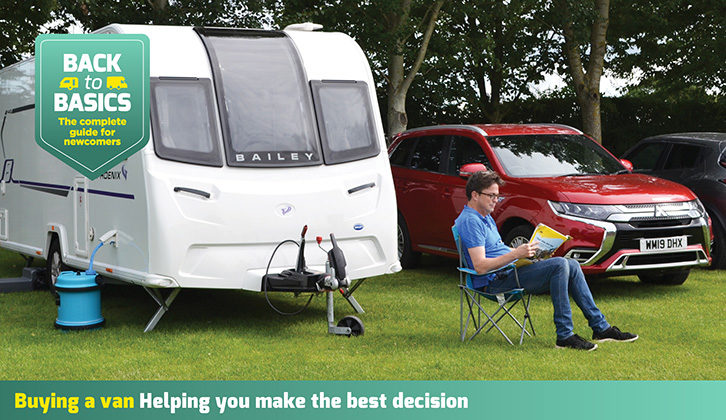When you’re making a major purchase, such as buying a caravan, it’s important to know your rights if something goes wrong.
The Consumer Rights Act 2015
The Consumer Rights Act (CRA) is designed to make consumer law easier to understand, so customers can buy and businesses can sell in confidence, knowing where they stand.
First coming into force in 2015, the Act consolidated 12 pieces of consumer-related law (including the Sale of Goods Act and Supply of Goods and Services Act), aiming to reduce that to three sections – Consumer Protection Regulations, Consumer Contracts Regulations and the CRA.
The latter covers the supply of goods, including the sale of caravans, motorhomes, accessories and related services.
It also follows the processes for when those goods fail to perform to the contract, including the following:
- There is a short-term right to reject a product, but this has to be exercised within a period of 30 days, for goods that fail to conform (that is, goods that are seriously defective).
- There are also first-tier remedies. These require a trader/dealer to repair or replace goods deemed to be faulty. If any non-conformity is not resolved after one repair, or one replacement, or if a new non-conformity arises, there are second-tier remedies.
- Second-tier remedies can be a price reduction, for example, if you decide to keep the product despite its faults. Or you can reject and claim a refund, partial or full. In that case, the dealer might be able to make a reduction for use.
- The 30-day period runs from whichever is the later of the transfer of ownership, or possession, or delivery.
Consumers have a right to remedies both within the initial 30 days and after it. If goods do not conform to contract within the first six months, consumers are entitled to request their repair and/or replacement, because any fault will be presumed to have been in existence at delivery.
You cannot insist on a replacement where it would be disproportionate in terms of the costs of providing any repair.
Advice from the NCC
We spoke to Jo Chubb from the NCC; here’s her advice.
“Leisure vehicles are very emotional purchases. You have to try to take the emotion out of the buying process.”
“I always liken purchase of a leisure vehicle to getting married with a pre-nup. You’re buying into a lifestyle, and it’s fantastic. However, you have to put your sensible head on, in case things go wrong further down the line.”
“Typically, we find that many customers discover things like the CRA after something has gone wrong. Good advice is to have general knowledge of your rights as a consumer before you begin to look for that dream vehicle.”
“A good place to start is to visit the websites of bodies such as the Consumers’ Association and Citizens Advice, for useful, friendly, simple guides.”
“The ‘buyer’s remorse’ scenario inevitably comes into play from someone buying without thinking it all through.”
“If there are any niggles you’re not sure about, ask the dealer. Don’t feel you have to sign on the dotted line on the day. The dealer will be grateful for this down the line.”
“Check with your family, sort your finances and so on, do whatever it takes to eradicate that niggle. Remember, this is a very big investment.”
“The Approved Dealer Scheme is relatively new. However, we have strict criteria. For example, anything that a dealer sells (caravan or motorhome) has to be NCC Approved and/or have an equivalent European rating.”
Key points
- If anything goes wrong, liability lies with the dealer, rather than the manufacturer.
- There is no such thing as a non-returnable deposit. Under the Consumer Contracts Regulations, if a sale fails to go through, the dealer can keep the deposit, but only as much as it can evidence as an actual cost to it.
- Shows are great places to buy a caravan. They are ideal for taking advantage of good special offers and so on. However, it is important to make sure that you do your homework beforehand. Do not impulse buy at a show!
- Don’t forget to refer to the Practical Caravan Owner Satisfaction Awards – the only ones of their type in the market. These annual awards are based on reader feedback and will direct you towards the best dealerships.
- The NCC can only deal with complaints involving an NCC member (however, it can point you in the right direction for further help if you need it). In addition, it only deals with complaints in writing. The reason for this is obvious – there needs to be a written record of who said what and when they said it.
- Worst case scenario? Visit your solicitor.
Take a look at our financing a caravan guide too, to find out about the different options for covering your purchase. Wondering what to expect when you’re picking up your tourer? Our guide to collecting a caravan talks you through what you can do to get to grips with your new tourer.
Are you looking for some more buying advice to help you choose the van for you? Then be sure to head to our Back to Basics: Buying a van category!
Our guide to the best used tow cars could help you find the ideal pre-owned towing vehicle to suit your needs.
If you’ve enjoyed reading this article, why not get the latest news, reviews and features delivered direct to your door or inbox every month. Take advantage of our brilliant Practical Caravan magazine SUBSCRIBERS’ OFFER and SIGN UP TO OUR NEWSLETTER for regular weekly updates on all things caravan related.









